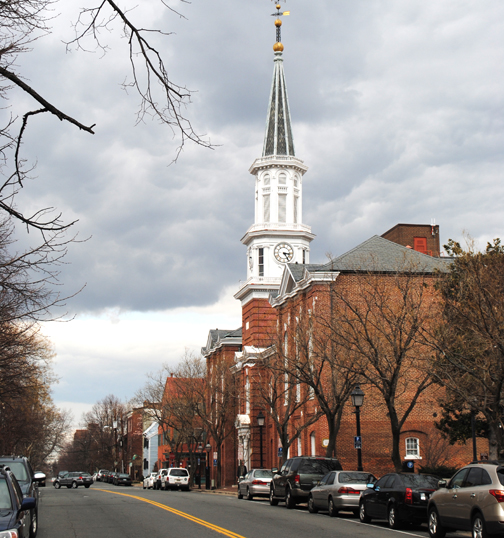
By Erich Wagner (File photo)
City preservationists tightened procedures for inspecting renovated properties in historic districts after a convoluted case involving vinyl windows and building permits surfaced last month.
On October 19, Brian Thomas, a real estate investor and Del Ray resident, appealed a board of architectural review ruling that penalized a couple who bought one of his refurbished homes in the Parker-Gray neighborhood. Thomas fought on behalf of the homeowners, who were in violation of city codes for having vinyl windows, a restricted material in the historic district.
Thomas testified before city council that he was unaware such window frames were forbidden. And the violation went unnoticed despite multiple city inspections during the renovation project.
It was only after he sold the home in January 2012 that the mistake came to light, Thomas said.
“On October 17, [2011], I applied for final inspection of the property, and that usually takes about two weeks to turn around,” Thomas said. “So I sold the house, and I moved on. It wasn’t until March [of 2012] that planning and zoning finally went and did the inspection for their part. … I just think the process broke down.”
Al Cox, the city’s top preservationist, said multiple breakdowns led to the oversight. Thomas never applied to replace the windows, though he secured other renovation permits. And while the house was zoned for residential use, it was listed as a commercial property in the building code.
Because of the erroneous categorization, preservation staff did not know about the renovation project until Thomas filed for a final residency permit.
“When he purchased it, he did the work under the commercial code,” Cox said. “Yet when he got his final inspections, that’s when he applied for the change of use and that’s what triggered us coming out.”
As a resident of the historic district, City Councilor Paul Smedberg also has seen occasional delays in preservation staff informing residents of architectural infractions.
“I personally know of three families who bought houses and only later got letters saying to take out the vinyl windows,” Smedberg said during the council hearing. “[If] we grant this appeal, I know we are going to be sitting here every Saturday hearing these cases. But this one case, on a certain level, does bother me.”
Before city council voted unanimously to reject the appeal, Euille wanted confirmation that the homeowners wouldn’t suffer financially.
“I want to confirm that you’re willing to correct the windows and not put the burden on them,” Euille said.
“I won’t leave them hanging,” Thomas replied. “But I do think this could have been resolved a long, long time ago.”
Preservation staff moved immediately to close the loopholes that led to the oversight. Before Cox left City Hall, he made sure his staff would — henceforth — get alerted about any project in the historic district.
“In the past, the board of architectural review staff was only notified when a project was complete when it was part of a major addition or brand new construction,” Cox said. “[Now] we will be notified of every building permit. … Even when someone is putting on new siding, we’ll go out.
“It’s out of an abundance of caution, and it means more work for us … but we’ll check them out on the way into the office or on the way home.”










